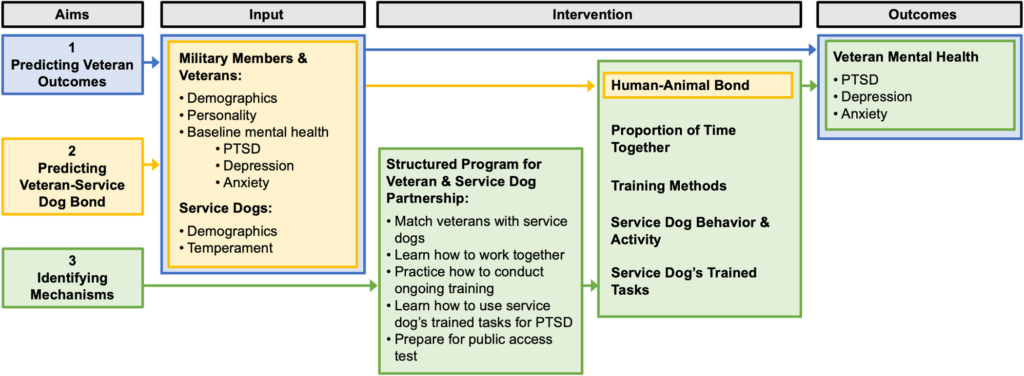WEST LAFAYETTE, IN — Post-traumatic stress disorder (PTSD) impacts 11-20% of Iraq and Afghanistan War veterans and can have a significant effect on quality of life. Research has shown that veterans with specially-trained PTSD service dogs report significantly less symptom severity and better quality of life than those without a service dog.
But the exact mechanism by which these dogs help—or how that help differs among veterans—is not well understood. A new study provided a better understanding of how veterans and service dogs interact, work together and bond with each other. It also assessed how individual differences among veterans and service dogs might predict the nature of the partnership.
The study, published in PLOS ONE, was conducted in partnership with the nonprofit national service dog provider K9s for Warriors. “Through this partnership we were able to contact military members and veterans who were on the waitlist to receive a service dog for PTSD and invite them to participate in our study,” said Clare Jensen, a graduate student researcher at Purdue University’s Center for the Human-Animal Bond and the study’s lead author.1
Participating in the study were 82 post-9/11 military service members or veterans and service dog pairs. The trial consisted of two periods: a baseline assessment, which took place in the month preceding the PTSD service dog placement, and a follow-up assessment, which took place three months later. Both assessment periods occurred in the participants’ homes, facilitated by mailed study materials, online surveys and telephone calls with the research team.

A Veteran and His Best Canine Friend
A new study provided a better understanding of how veterans and PTSD service dogs interact, work together and bond with each other. The photo is from K9s for Warriors, which provides highly-trained service dogs to military veterans suffering from PTSD, traumatic brain injury and/or military sexual trauma.
“Study measures included dog temperament tests, surveys about veterans’ mental health and human-animal bond, daily smartphone check-ins about veteran and dog interactions, and Bluetooth monitoring of time veterans spent with their service dogs,” Jensen said.
Predicting Efficacy
The specific aims of the study were to evaluate service dog characteristics as potential predictors of efficacy, assess dog and human characteristics as potential predictors of veteran-dog bond and explore potential mechanisms for mental health outcomes.
“Veterans and their service dogs were together for an average of 20 hours per day, and veterans most frequently asked their service dogs to complete the specially trained task to help calm or comfort their anxiety,” Jensen advised. Tasks PTSD service dogs are trained to perform include applying pressure to alleviate anxiety, nudging to interrupt flashbacks and waking from nightmares.
Other key findings of the study included:
- Most service dog characteristics did not predict veterans’ mental health outcomes, but lower service dog excitability was associated with less PTSD symptom severity at follow-up.
- Closer dog-veteran relationships were associated with less-excitable dog temperament.
- More frequent use of the trained service dog task to signal when someone approaches from behind (cover/watch back) was associated with greater anxiety but less PTSD symptom severity.
- Worse mental health at follow-up was associated with greater use of the specifically trained PTSD service dog task to initiate a social greeting (“make a friend”), whereas better mental health was related to less use of dominance-based training methods, lower perceived emotional/logistical costs of service dog partnership and closer veteran-dog relationships.
“Findings such as these can be used to inform which components of service dog partnership for PTSD might be more related to the veterans’ outcomes,” said Jensen. “Although we are not yet able to say which components of the partnership are responsible for the effects of service dogs on veterans, it does help us to identify some potentially valuable avenues for further exploration.”
K9s for Warriors, located in Ponte Vedra, FL, provides highly-trained service dogs to military veterans suffering from PTSD, traumatic brain injury and/or military sexual trauma. Most of the dogs come from high-kill rescue shelters, according to the group’s website.
- Jensen CL, Rodriguez KE, MacLean EL, Abdul Wahab AH, Sabbaghi A, O’Haire ME. Characterizing veteran and PTSD service dog teams: Exploring potential mechanisms of symptom change and canine predictors of efficacy. PLoS One. 2022 Jul 27;17(7):e0269186. doi: 10.1371/journal.pone.0269186. PMID: 35895599; PMCID: PMC9328544.


